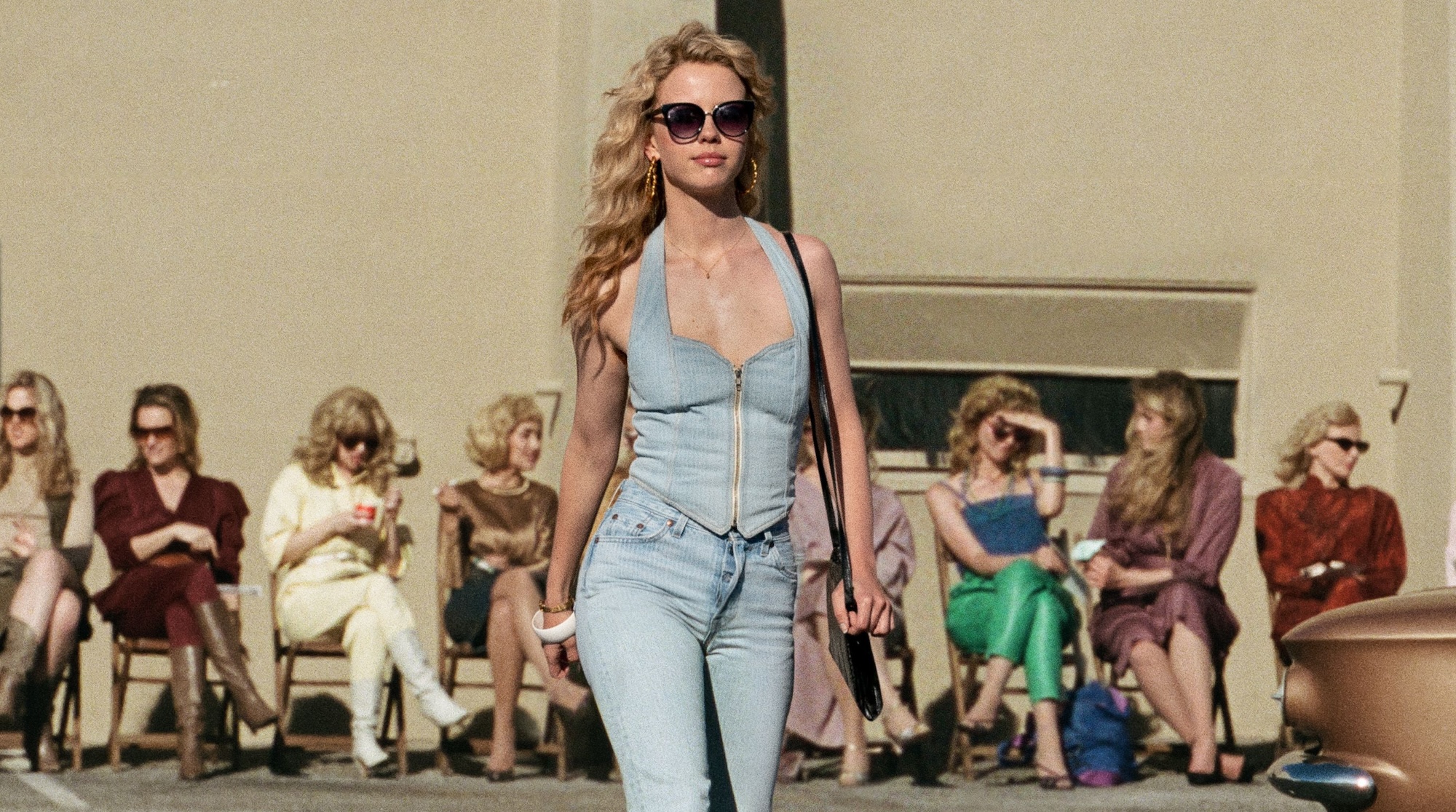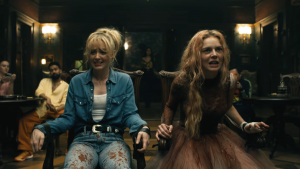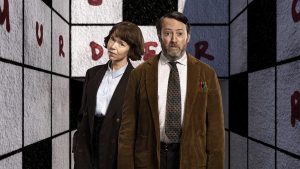
“A B-movie with A-movie ideas.” That is how an eminently driven, and fictional, film director describes the horror movie sequel she’s developing in MaXXXine. Yet Ti West’s assertion through her will be lost on no one walking into this third triumphant installment of the decade’s most unlikely franchise. What began as a lean and mean throwback to ‘70s independent sleaze in all its shadings—from the grindhouse to the porno shop—has turned into a tryptic of longing and ambition, love for cinema’s power and anguish at beholding the full desolation its legacy can bring. When the trilogy concludes this Fourth of July weekend, it will even count Martin Scorsese among its admirers.
That’s a lot of weight to be placed onto what is still in its heart of scuzzy hearts a lurid genre offering with enough gore to fill a Bates Motel shower (an actual location in the film, come to think of it). It’s also an unenviable amount of pressure placed on its lead character, the newly rechristened Maxine Minx. But Maxine is still played by Mia Goth, and you feel it in your bones that when she says “I’m a star” this time, she’s no longer whistling “Landslide.” In fact, she’s at last in a movie where West and Goth’s proclivities for enough excess to border on camp blends perfectly with the mise en scene of any other Saturday night on the Sunset Strip.
The trilogy has indeed made it to the 1980s, which means nothing is out-of-bounds—and nothing can therefore be fully held against a movie embracing the gauche spectacle of the slasher genre’s golden age. Hence after spending two films studying the cruelty of amateurs dreaming of being on the silver screen—whether while getting their hands dirty in DIY ‘70s porn via X or in the shinier, but no less desperate, silent era of early 1920s America in Pearl—MaXXXine picks up six years past the moment where Maxine killed Old Woman Pearl (both played by Goth). And she’s gotten further than either of them would dare previously dream, at least insofar as she’s getting auditions for B-horror movies in Hollywood by day while still moonlighting as an adult film star at night.
It’s 1985 now, and horror is big business in the age of VHS, even if the industry views it as so indistinguishable from pornography that someone like Maxine can get her foot in the door. The synthesized music is loud, the fashion louder, and “the Night Stalker” is murdering women throughout southern California. An opening credits montage that contrasts the nightlife of mid-‘80s Hollywood and news reports on that real-life serial killer sets a tone of intense danger, dread, and perverse excitement.
It is in this crucible that Maxine’s success might finally come when she is hired by the ambitious genre director Elizabeth Bender (Elizabeth Debicki) to star in The Puritan II, a folk horror flick that’s a step enough away from the video nasties of its era to be filmed on the Universal Pictures backlot. As Maxine’s big break arrives, however, so too does a seeming blackmailer whose face she never sees. Even so, his lackey—a private dick played by Kevin Bacon with a delightfully terrible Cajun accent—is always fast on her heels. Meanwhile friends and colleagues in the adult film scene appear to be dying at an alarming rate and in increasingly heinous style. The press think it’s the work of the Night Stalker, but Maxine knows all too well that some things you leave buried in the swamp have a way of floating back up.
From its setup alone, MaXXXine is obviously a much more elaborate film than either X or Pearl. Both of those pictures were shot on the same “Texan” (read: New Zealand) farm. They were true indie experiments that attempted to channel the aesthetics of cinema eras past on a budget and in a remote location. Their runaway success and popularity opened MaXXXine up to be grandiose, and more than one person I’ve talked to compared it to Once Upon a Time… in Hollywood. The 43-year-old West exudes copious amounts of nostalgia, too, while recreating the look of ‘80s Hollywood. Which is to say it’s notably far more of a cesspit than a film set in 1969.
So the comparison is partially apt, but the nostalgia just isn’t for an era of Los Angeles lore gone by. Instead West is chasing a style of genre filmmaking that’s gone out of vogue. While horror has definitely had a renaissance in the last decade—with West himself lightly chiding me when I used the word “elevated” while discussing X with him several years ago—the horror of today is generally reaching for a more psychological and humane grounding. In other words, it makes for an easier bedfellow when excavating the visceral dread of ‘70s indie cult classics like The Texas Chain Saw Massacre, as well as the Val Lewton-infused lushness of Pearl.
MaXXXine, by comparison, is a chance to embrace some of the seedy absurdity of the genre’s trashiest and most decadent era. That includes sequences of Maxine being stalked by a killer in a fog machine-filled back alley, and murder sequences that are more reminiscent of Sean S. Cunningham junk than Tobe Hooper or John Carpenter. But it’s part and parcel for a love of a time and place that extends even beyond simply horror.
In one sequence, in particular, Bacon resembles Jack Nicholson in Chinatown as he pursues Maxine on the Universal backlot; and the Hollywood homicide detectives played by a fun if underused pairing of Michelle Monaghan and Bobby Cannavale might as well be out of any ‘80s cop movie—complete with MaXXXine’s third act detour into action movie spectacle.
All of these varied qualities and an overstuffed cast of impressive talents, including Giancarlo Esposito as the kindest agent in Tinseltown, will undoubtedly turn off some viewers who appreciated the simplicity and clarity of purpose in X and Pearl. Despite its gargantuan scope, MaXXXine is probably the thematically thinnest of the three films. It’s as enamored with the joke of casting Bacon—an actor who like Maxine got his start in ‘80s Hollywood’s horror basement—as it is with Maxine’s own personal demons. And yet, we’d argue MaXXXine is probably the frothiest and most breezily entertaining of the three because it revels in its indulgences, right down to a third act that skips by the obvious grim ‘70s Hollywood ending in favor of a little Bruckheimer and Simpson fairy dust.
Most importantly, though, it still has a not-so-secret weapon, and that’s Goth as a woman hungry and ruthless enough to exploit the entertainment industry’s Dantesque layers of exploitation. In a performance as steely as Pearl’s was brittle, Goth repeats the latter’s “I’m a star” line, but now with bottomless conviction during the first scene of MaXXXine. It’s the sequence where an also superb Debicki is auditioning the lowly porn star for a scream queen role. In one long close-up, Maxine/Goth recites a textured and immensely captivating soliloquy about being a young woman tormented and inspired by the demon inside her.
Goth, and by extension this whole trilogy, is likewise possessed by a force that is malevolent, merciless, and entirely artificial. They are driven by the power of the movies, or at least the power their fantasy holds in the minds of wannabes like Maxine Minx. And when Goth looks dead into the frame, tears in her eyes, and speaks of the agony and ecstasy of this monster within, you want to believe too.
MaXXXine is in theaters on Friday, July 5.
Learn more about Den of Geek’s review process and why you can trust our recommendations here.
The post MaXXXine Review: Ti West and Mia Goth Embrace ‘80s Camp appeared first on Den of Geek.











